Community Cats is a 501(c)(3) non-profit formed in 2003 that advocates for animal welfare
and In 1999, Community Cats organized and in 2003
became a 501(c)(3) non-profit which advocates for
animal welfare and partners with organizations to
provide access to quality spay/neuter services in our local area.
Along with Washoe County, Community Cats endorses the
Trap, Neuter, Return (TNR) Program
and is dedicated to partnering throughout Northern Nevada to
promote the benefits of TNR – the cost-effective, efficient and
humane way to manage free-roaming cat populations.
Non-profit EIN #31-1823161
with organizations to provide access to quality spay/neuter services in our local area.
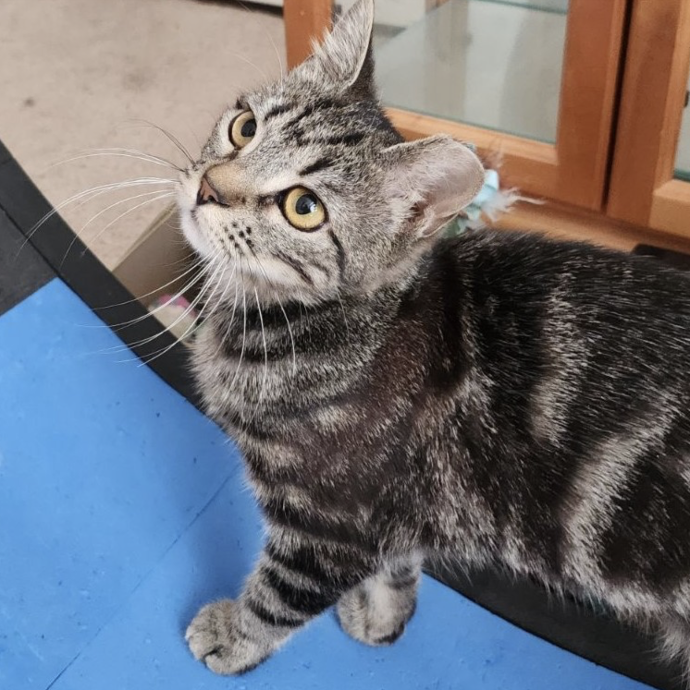
Celebrating 25-Years as a Local Grassroots Movement helping cats and people
Since Sept. 2023, 114 cats helped in Ward 1 by Community Cats! Thank you to Reno City Council Member Jenny Brekhus for supporting Community Cats.
In 1999, Community Cats organized and in 2003 became a 501(c)(3) non-profit which advocates for animal welfare and partners with organizations to provide access to quality spay/neuter services in our local area.
Along with Washoe County, Community Cats endorses the Trap, Neuter, Return (TNR) Program
and is dedicated to partnering throughout Northern Nevada to promote the benefits of TNR – the cost-effective, efficient and humane way to manage free-roaming cat populations.
I am glad to let you know that your episode is officially live on the podcast! Your episode can be found wherever folks get their podcasts. It is also available on our website at:
Your episode is #567 and can be found wherever folks get their podcasts, on our YouTube channel, or on our website at www.communitycatspodcast.com/podcast
I have attached some graphics which you are welcome to use. Please share with your networks and ask them to subscribe to Community Cats Podcast for more quality content every week. They can visit www.communitycatspodcast.com/subscribe to follow us wherever they listen.
Thanks again for working with us, and all you do for cats!
Kendall Wapner
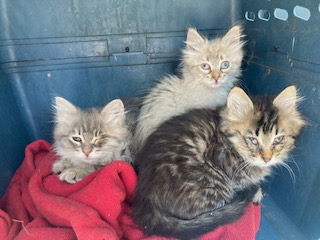
Since Sept. 2023, 105 cats helped in Ward 1 by Community Cats! Thank you to Reno City Council Member Jenny Brekhus for supporting of Community Cats.
Community Cats News 2023!
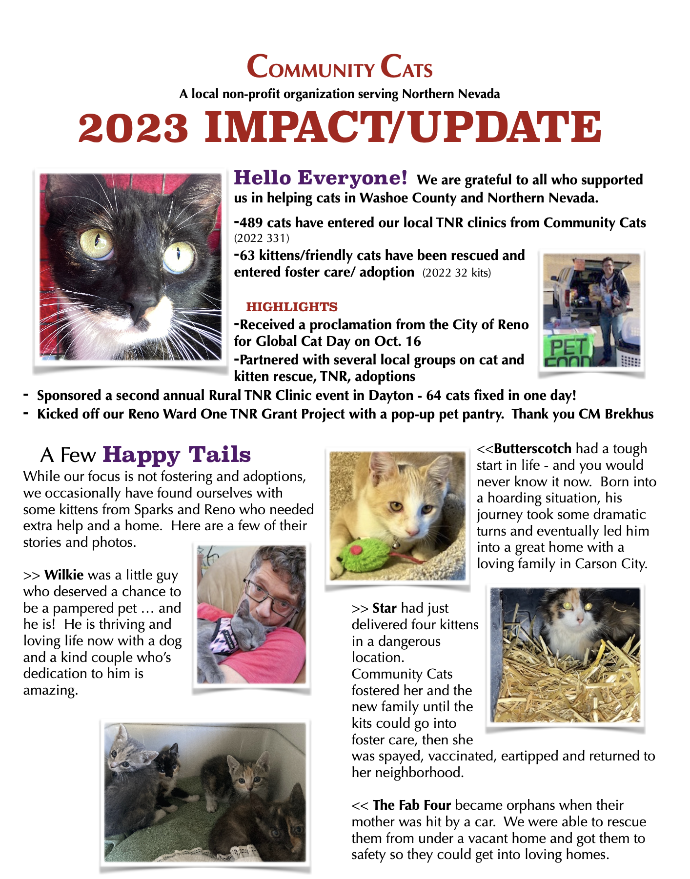
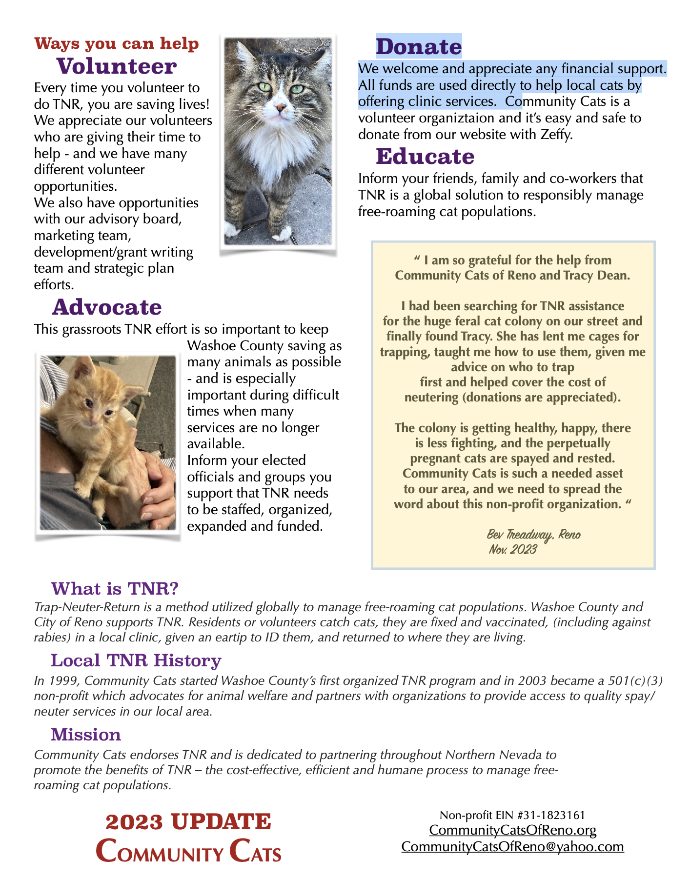
Local Non-Profit Community Cats of Reno,
Partners with Organizations on Multiple Projects
Reno, NV - August 2023 - Last month, Community Cats partnered with five other groups to facilitate TNR - Trap, Neuter, Return - plus cat rescue efforts at two locations, with over 44 cats being helped in total for these special projects.
When a colony of outdoor cats needed attention in northeast Reno, the SPCA of Northern Nevada asked Feral At Heart and Community Cats to be “boots on the ground” to evaluate the situation. Cats and kittens received medical care if needed or entered foster care, while others were examined, vaccinated, spayed/neutered, eartipped and returned to the colony. The eartip is given to identify cats as having gone through our local TNR program, which began in 1999. Options Veterinary Care performed the TNR surgeries over two days, just for this special project. "The team at Options did a terrific job adding these extra clinic days to their already full schedule," said Community Cats Director Tracy Dean.
At a different location, some kind folks in southeast Reno became overwhelmed with cats in their home and needed help to get some fixed and help finding homes for the rest. Nevada Humane Society enlisted the volunteer help of Community Cats to contain and transport the cats into their facility.
“Community Cats is happy to partner with agencies in the area to work out a solution that balances the well being of cats, people and neighborhoods,” said Dean. “Thank you to Washoe County Regional Animal Services staff for their assistance and identifying these locations as needing help from our local animal community.”
Community Cats helped over 330 cats in 2022, as part of its regular efforts.
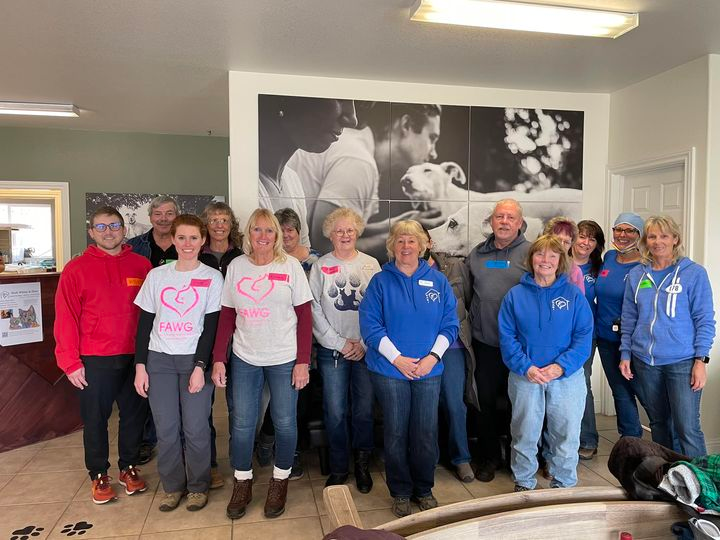


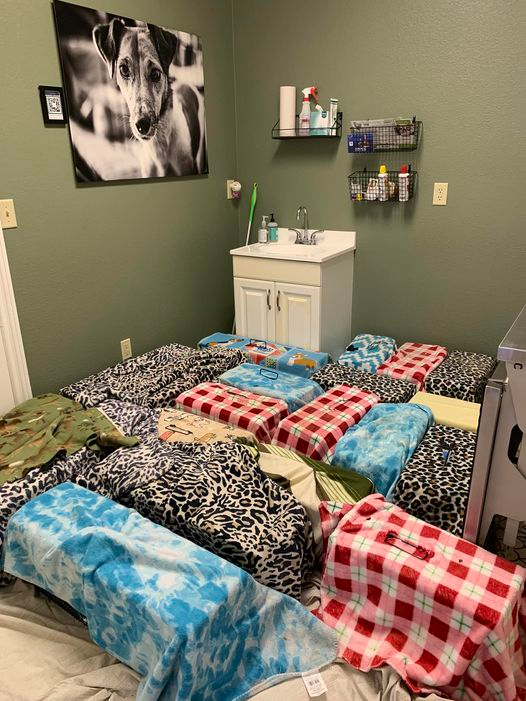

Community Cats continues to “Spay It Forward” and is helping subsidize the cost of cats being fixed at local low cost spay/neuter clinics! We assist local residents plus partner with other local groups and municipalities of offer spay/neuter services. Community Cats is made up of volunteers so no salaries. That means funds go directly to help local cats and people and we rely on donations to continue providing assistance.
As we look back on 2022, we are astounded at the measurable progress made:
- Over 330 cats have been spayed/neutered/vaccinated through local low-cost clinics
- 32 kittens have been rescued and entered foster care for adoption
- 24 Cat Grants have been issued to local TNR volunteers who are helping others
Good folks who are helping cats beyond the Reno/Sparks area have also been assisted in getting cats into the clinics to be spayed/neutered and vaccinated. People in Yerington, Doyle, Fallon and more have reached out for help and we do what we can to Spay It Forward. We know how important partnering with clinics, agencies and groups does the most good and that this grassroots effort is vital for Nevada, in addition to improving the lives of animals and people of our community.
Hello All.
For Global Feral Cat Day on October 16, we at Community Cats asked just a handful of the folks who have been part of our local TNR program what this resource has meant to them. Below are their comments, most completed untouched by me. I did shorten a few and did highlight an important point made by the first person on this list.
Because our volunteers are the ones who interact with the clinic staffs of your organizations, most of the folks do not come into the clinics and do not have a chance to voice their thoughts and appreciation.
Community Cats is dedicated to facilitating access and supporting local TNR resources, both short term efforts and long range planning.
Grateful for this opportunity.
Tracy Dean on behalf of Community Cats.
--------------------------------------------------------------------------------------------------------------------------
From: Bonny Brown
Subject: RE: WE STAND UP FOR TNR
Tracy,
Thanks so much for pulling this together and sharing these comments. As many of the writers point out, without truly robust TNR efforts in a community shelter intake increases, resources and staff are increasingly strained, and it results in far greater suffering for cats.
We are so very grateful for the great work of Community Cats, providing information and TNR services in the community. It is truly invaluable! You do a truly remarkable job! We really do need more resources in the community to support TNR. It really is going to require a team effort with all of us doing all we can.
Thank you again for all that you do!
-Bonney
P.S. We also appreciate working with the SPCA and some of the rural rescues on TNR efforts.
P.P.S. We really cannot thank you, Tracy and Community Cats, enough for your work.
Bonney Brown
_________________________________________________________________________________________________
Here are some of the comments from the community.......
M.S. and J. H. Reno, writes:
I want to thank you again for all the assistance you provided me, when 3 adult feral cats and one young litter of kittens showed up in our neighborhood a bit more than a year ago. We were totally unfamiliar then with TNR, but with your training and experience, and access to cat traps, we finally trapped two unneutered males and one fertile female. Unfortunately, we were unsuccessful in trapping the other female until having trapped and surrendered to Washoe County Animal Control/NHS three successive litters this past year! So I continue to be incredibly grateful not only for your assistance, but so importantly, for both Options' and NHS' TNR services; they provided the spay and neutering of our feral cats. Without TNR services we will never approach control of the region's feral cat population. I cannot imagine our community without this invaluable resource.
R. M. Reno writes:
TNR is a necessary system to address the feral cat situation created by our society’s lack of responsibility with respect to feline populations. TNR does control feral populations. I have interfaced with other trappers and colony caretaker/monitors. We have specifically observed populations drop from over 20+ to less than ten, with the eventuality of their being zero. Without TNR clinics population numbers would skyrocket.
L. P., Sparks, writes:
To those who care
The TNR clinics, and those that support them, are an invaluable resource. The work done, the care involved, are beyond measure. Our neighborhoods need this resource to provide care and to have a humane option for care. Tracy Dean has done an immeasurable service to those of us on our street. TNR clinics provide the care, the outcomes, and I can attest to the success. TNR is there to help the wild ones. We should be too.
J. W.,Sparks, writes:
To whom it may concern:
The TNR Clinics are vital to our community and the work they do is essential to combat the local feline population. Without them, I cannot imagine the negative impact it’d have on the neighborhoods and surrounding areas of the community. I’m not only personally grateful but I also can’t begin to express the appreciation I’ve received in the extended community impacted by the amazing work they do for The greater Reno and Sparks area.
R.Z. Reno writes:
I had worked with the NV Humane Society for many years fostering approximately 85 kitties and know the impact and need of the TNR clinics. Tracy Dean is an amazing lady whose contributions to the feral cat community are immense. Her efforts and others dealing with TNR are so important and should be 100% supported and understood to be essential.
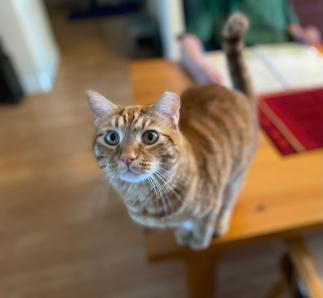
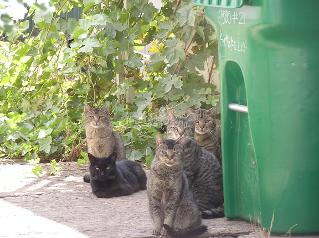
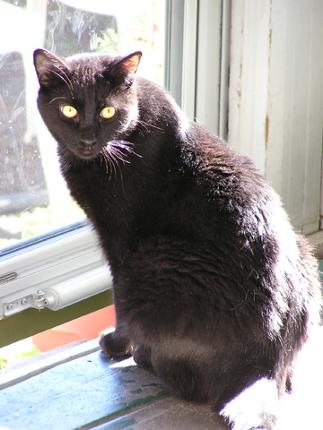
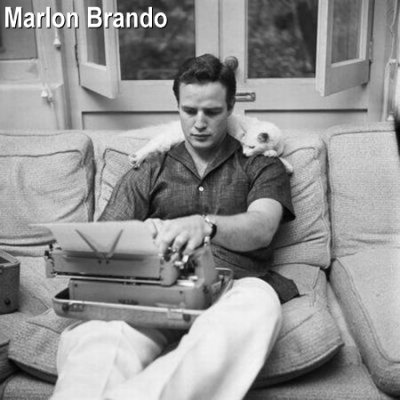
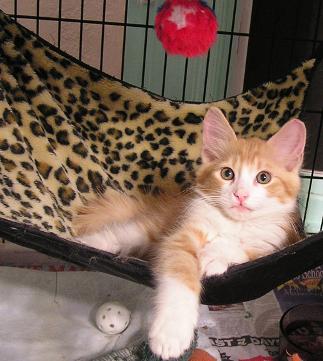
Good News!
The Director of Washoe County Regional Animal Services, Shyanne Schull, points to a decrease in the number of feral cats that have had to be taken in over the past decade. She said that the decrease indicates a correlation between the number of feral cats and better population management (meaning TNR). "In 2005 the rough number of cats that Animal Services took in was around 6,800" Schull said. "In 2014, we took in just over 3,900."
This is Funny Face . . . Born at a local park in Sparks in 2007. He has gone through the TNR program and has become quite a character at feeding time.
Where do all the cats come from?
You've probably seen them gathered around dumpsters and in parking lots . . . homeless cats that flee from humans. These feral cats are the result of both the failure of people to spay or neuter their cats and cat abandonment. These animals are victims of indifference.
The Trap-Neuter-Return (TNR) program gives these cats a better quality of life. It is an effective, internationally recognized program which feral cats are trapped, vaccinated, spayed or neutered, given basic medical assistance and returned to their original location.
There are more than 60 million homeless cats in the United States. We estimate there are 25,000 in Washoe County alone, living in our industrial parks, residential neighborhoods and business districts. TNR is a proven method of population control that is practiced around the world and throughout this country.
Did You Know?
• Cats can start mating as early as four months.• Even indoor-only house cats often find ways to get outdoors when the sexual urge hits them. Whether they disappear for good (due to panic, accidents, or enemies) or they return home, kittens are the result.
• An unaltered male cat can father hundreds of kittens a year.
• Statistically speaking, even if a person finds good homes for a litter of kittens, some of the kittens will grow up and produce litters and litters of kittens.
• Spaying a female before her first heat protects her from risks of uterine, ovarian and mammary cancers.
• Spaying also protects her from the stresses of pregnancy.
• Spaying reduces her frantic interest in the outdoors and reduces the chances she'll wander far.
• Spaying reduces the chances she'll mark your home with urine when she's in heat.
• Unaltered cats have urges that make them irritable and anxious. They yowl and whine frequently, fight with other cats, and/or destroy objects in the house.
• Neutering a male reduces his risk from numerous health problems.
• Neutering lowers his urge to roam and to fight, and thus lowers chances of disease transmission and woundings.
• Neutering also reduces his tendency to spray in the home.
• And neutering eliminates the powerful odor of male cat urine.
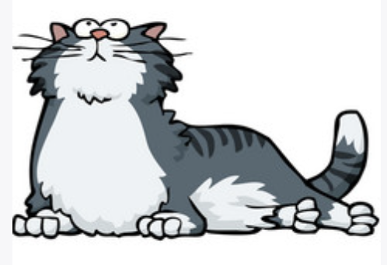
- “In ancient times cats were worshipped as gods; they have not forgotten this.” – Terry Pratchett
